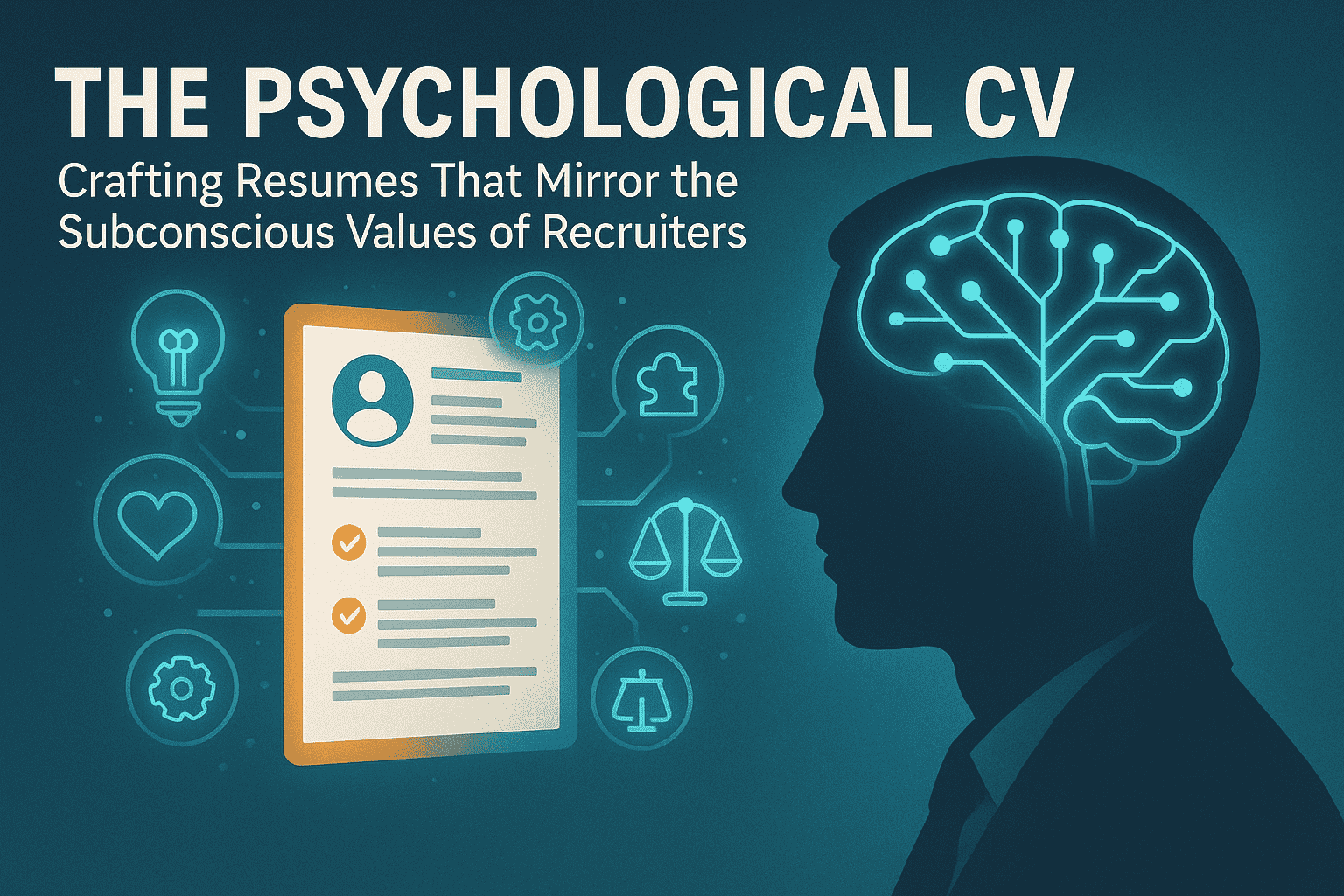The Psychological CV: Crafting Resumes That Mirror the Subconscious Values of Recruiters
In today’s hypercompetitive job market, standing out with a clean, well-organized CV isn’t just enough. Recruiters are skimming hundreds of applications in minutes. But what if your resume could do more than convey facts? What if it could whisper to the subconscious mind of the recruiter, evoking trust, competence, and alignment—before logic even kicks in?
Welcome to the world of the Psychological CV—a revolutionary approach to crafting resumes that connect with the hidden decision-maker: human intuition.
The Recruiter’s Brain in 6 Seconds
Studies have shown that recruiters spend an average of 6 to 8 seconds scanning a resume before making a snap judgment. That decision is not made through deep analysis—it’s instinctual, driven by visual cues, emotional language, and familiar patterns.
What happens in those 6 seconds?
The eye seeks order: headings, alignment, layout.
The brain seeks certainty: job titles, dates, clean design.
The subconscious seeks safety: someone who seems competent, loyal, and likable.
The result? You’re judged before your experience is fully processed.
Emotional Language Triggers in a CV
The right words doesn’t just inform—they move. Traditional resumes rely heavily on action verbs: Managed, Led, Created. But psychological CVs tap into emotionally resonant languages like:
Trust triggers: Reliable, dependable, consistent.
Growth signals: Transformed, evolved, navigated.
Team resonance: Collaborated, inspired, uplifted. For example:
Traditional: Managed a team of 10 staff.
Psychological: Inspired a 10-person team to exceed monthly targets consistently.
Subtle, but powerful. One speaks to actions. The other speaks to emotional impact.
Mirroring the Recruiter’s Subconscious Priorities
Humans subconsciously trust those who reflect their values. You can use this mirroring effect by subtly aligning your language, structure, and tone with the company's known priorities by studying the company’s About Us page, mission, and vision. Identify repeated values or emotional tones (e.g., “innovation,” “integrity,” “collaboration”). Reflect those themes back in your bullet points, skills, or summaries. You're not changing your story—you're presenting it in their mirror.
Visual Psychology of Resume Design
Visuals matter. Even in a black-and-white document, design influences trust. Key psychological principles:
Whitespace = calm. Cramped text = stress.
Symmetry = balance. Asymmetry = unpredictability.
Serif fonts (like Times New Roman) evoke tradition and authority.
Sans-serif fonts (like Calibri) suggest modernity and clarity.
A clean, well-spaced resume with clear hierarchy creates a sense of
professionalism and control, which the brain translates as trustworthiness.
Anchoring Bias and the Rule of Firsts
Humans are wired to cling to the first information they see. In resumes, this is known as the anchoring bias. So, what should be at the top? A summary that reads like a confident introduction. Top skills tailored to the role. An early highlighted achievement (quantified) to shape perception.
Example:
Award-winning digital marketer who scaled a startup’s ad performance by 180% in 6 months. Known for combining data insight with creative storytelling.
This sets the tone for the rest of the resume—even before the recruiter gets there.
Building the Narrative Storyline
A psychological CV isn’t a dry list—it’s a story of transformation. Every section should:
Show progression (entry role → leadership → innovation). Explain cause and effect (did X, which resulted in Y). Build a subtle hero’s journey—you faced a challenge, grew, and brought value. Even bullet points can become story fragments: Instead of: Handled client communication. Try: Transformed difficult client relationships into long-term partnerships, resulting in 22% client retention growth.
Rational CV vs Psychological CV
Let’s compare.
Traditional CV bullet point:
Led 5 projects across 3 departments, meeting all deadlines.
Psychological CV bullet point:
Facilitated cross-departmental synergy by aligning diverse team motivations and communication styles, resulting in the timely completion of five complex projects and a measurable increase in intergroup cohesion.
Same facts. But the latter: Adds human value. Suggests influence. Indirectly reflects a company’s potential priority: collaboration.
When tested with HR professionals, the psychological version consistently “felt” stronger—even when they couldn’t explain why.
Ethical Influence — Not Manipulation
Let’s be clear: The Psychological CV is not about deception. It’s about:
Framing truth more powerfully.
Presenting information in a way the human mind wants to receive it.
Evoking alignment, not tricking anyone.
When done right, this approach leads to better matches between candidates and companies.
In Conclusion: The CV That Thinks Before You Do
The job market of tomorrow isn’t just driven by skills—it is driven by perception. Your resume isn’t just a document. It’s a psychological handshake. It says, “I see what you value, and I embody it.”
So, challenge yourself: Don’t just rewrite your CV. Rethink how it makes someone feel.









